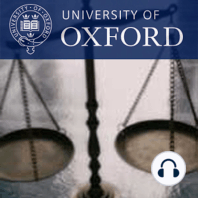33 min listen

Measuring Peace: Local Participation and Perspectives in Peacebuilding
Measuring Peace: Local Participation and Perspectives in Peacebuilding
ratings:
Length:
42 minutes
Released:
Nov 11, 2019
Format:
Podcast episode
Description
This talk was given as part of the Oxford Transitional Justice Research (OTJR) Seminar Series. Peace has been a notoriously difficult concept to measure because of the diverse ways in which it can be defined. Other than a general distinction between negative peace as the absence of violence, and positive peace as the absence of structural violence, i.e. norms, institutions, attitudes and societal features than can incite violence, there is little consensus on which norms, institutions, attitudes and societal features can nurture peace. On the one hand, policy makers need instruments to track progress on peace, whereas on the other hand, many peace scholars and practitioners suggest that peace is perhaps too complex to measure. I experienced this tension first-hand whilst leading a cross country participatory assessment of resilience in three post conflict contexts – Guatemala, Liberia and Timor-Leste – and subsequently when implementing population perception surveys on peace and justice in Eastern Congo. Last year, I conducted a systematic review of peace measurements, through which I identified 19 direct and proxy measures of peace that are used across policy and practice. In this talk, I will present the findings of the systematic review and situate them in the context of my experience with participatory approaches to defining and assessing peace in conflict affected contexts.
Anupah Makoond is currently reading for an MBA at the Saïd Business School, following an MSc. in Evidence Based Social Intervention and Policy Evaluation at the University of Oxford. Immediately prior to coming to Oxford, she led the Harvard Humanitarian Initiative’s Peace and Human Rights programmes in the DRC and the Great Lakes. Between 2014 and 2016 Anupah was the Programme Officer for Interpeace’s Frameworks for Assessing Resilience Programme.
Anupah Makoond is currently reading for an MBA at the Saïd Business School, following an MSc. in Evidence Based Social Intervention and Policy Evaluation at the University of Oxford. Immediately prior to coming to Oxford, she led the Harvard Humanitarian Initiative’s Peace and Human Rights programmes in the DRC and the Great Lakes. Between 2014 and 2016 Anupah was the Programme Officer for Interpeace’s Frameworks for Assessing Resilience Programme.
Released:
Nov 11, 2019
Format:
Podcast episode
Titles in the series (100)
Debating Transitional Justice in Zimbabwe: Victim-Centred Rhetoric or Reality?: Seminar delivered on Tuesday 10 November 2009 by Janice Winter, Programme Manager, Axess Programme on Journalism and Democracy. by Oxford Transitional Justice Research Seminars